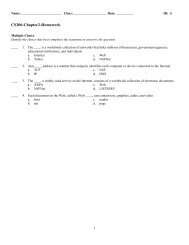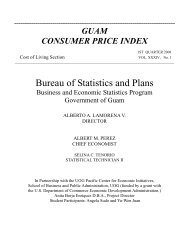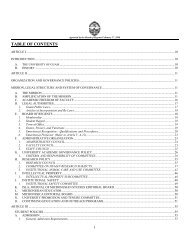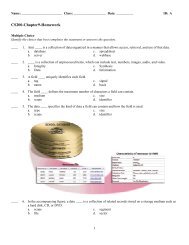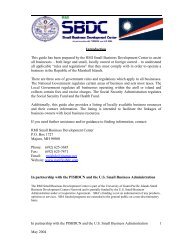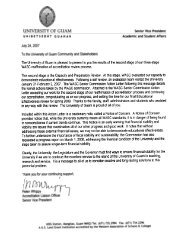Guam Business Resource Guide
Guam Business Resource Guide
Guam Business Resource Guide
Create successful ePaper yourself
Turn your PDF publications into a flip-book with our unique Google optimized e-Paper software.
5.1.GUAM TAX STRUCTURE<br />
The U.S. Congress created the Territorial Government<br />
of <strong>Guam</strong> as a separate taxing jurisdiction by<br />
enactment of the Organic Act of <strong>Guam</strong> in 1950.<br />
Section 31 of the Act provides that the income tax<br />
laws in force in the United States shall be the income<br />
tax laws of <strong>Guam</strong>, substituting <strong>Guam</strong> for the<br />
United States where necessary and omitting any<br />
inapplicable or incompatible provisions. The U.S.<br />
Internal Revenue Code with such changes constitutes<br />
the <strong>Guam</strong> Territorial Income Tax Law.<br />
5.2.GROSS RECEIPTS TAX (GRT)<br />
5.2.1 All businesses operating predominately in<br />
<strong>Guam</strong> are required to have an appropriate<br />
<strong>Guam</strong> <strong>Business</strong> License, and to register for a<br />
GRT number.<br />
5.2.2 All sales by your business are subject to<br />
GRT;<br />
5.2.3 All businesses with sales over $500,000 per<br />
year must pay 4% GRT on all sales to the<br />
Treasurer of Government.<br />
5.2.4 All businesses with sales less than or equal<br />
to $500,000 per year must pay 4% GRT on all<br />
sales over $50,000 to the Treasurer of Government.<br />
5.2.5 <strong>Business</strong>es with sales of less than $50,000<br />
per year must file monthly GRT reports but<br />
are exempt from paying the tax.<br />
5.2.6 GRT report filings and payments must be<br />
made monthly, no later than the 20th of the<br />
month after the month that the revenues/<br />
receipts are generated.<br />
5.2.7 <strong>Business</strong>es that add an additional 4% to the<br />
cost of an item to cover the cost of GRT<br />
may and should elect to pay "Visible GRT" on<br />
the GRT filing form.<br />
5.2.8 Wholesalers and certain other taxpayer<br />
groups are exempt from GRT, or entitled to<br />
rebates. Please refer to Section 7 below, or<br />
seek additional information from the Director<br />
of Revenue and Taxation.<br />
5.3 INDIVIDUAL, PAYROLL, OR PERSONAL INCOME<br />
TAX<br />
5.3.1 Individuals who are citizens or residents of<br />
<strong>Guam</strong> are required to report their income<br />
from all sources when computing their<br />
<strong>Guam</strong> taxes. Their income taxes must be<br />
paid into the Treasury of <strong>Guam</strong>. Nonresidents<br />
except those who acquired their<br />
U.S. citizenship through the Organic Act, or<br />
through naturalization proceedings in the<br />
District Court of <strong>Guam</strong>, incur income tax<br />
liability to <strong>Guam</strong> only on income derived<br />
from <strong>Guam</strong> sources. Self-employed individuals<br />
must file Schedule C with their individual<br />
income tax return Form 1040. A U.S.<br />
citizen who is a resident of <strong>Guam</strong> at the last<br />
day of the taxable year (usually December<br />
31) will be required to file an individual income<br />
tax return in <strong>Guam</strong> reporting his or<br />
her worldwide income. In such case the U.S.<br />
Internal Revenue Code provides that no return<br />
need be filed with the U.S. Internal<br />
Revenue Service.<br />
5.3.2 Individual income is progressively taxed at<br />
marginal rates ranging from 10% to 35% depending<br />
on the employee's pay level. These<br />
taxes are withheld from an employee's<br />
wages by the employer. The employer holds<br />
these taxes until it is time to deposit them<br />
with either the <strong>Guam</strong> or federal government.<br />
<strong>Guam</strong> individual tax rates are the<br />
same as those in the U.S. Internal Revenue<br />
Code and can be found in Section 1 of the<br />
<strong>Guam</strong> Territorial Income Tax Law.<br />
5.3.3 Individual income tax returns for the calendar<br />
year are due on or before April 15 of the<br />
following year. Individuals reporting on a<br />
fiscal year basis must file their returns on<br />
the 15th day of the fourth month following<br />
the close of the fiscal year. When the due<br />
date for filing a return or paying taxes falls<br />
on a Saturday, Sunday, or legal holiday, you<br />
may do that file and/or pay on the next<br />
business day.<br />
5.3.4 All businesses must file the Employer’s<br />
Quarterly Tax Return reporting the wages of<br />
their employees. Other related forms and<br />
payments must be filed and paid to the<br />
21





![Residence Hall Application Form [PDF]](https://img.yumpu.com/46340085/1/190x245/residence-hall-application-form-pdf.jpg?quality=85)


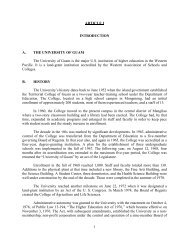

![Modern compiler design [PDF]](https://img.yumpu.com/37285279/1/190x245/modern-compiler-design-pdf.jpg?quality=85)
